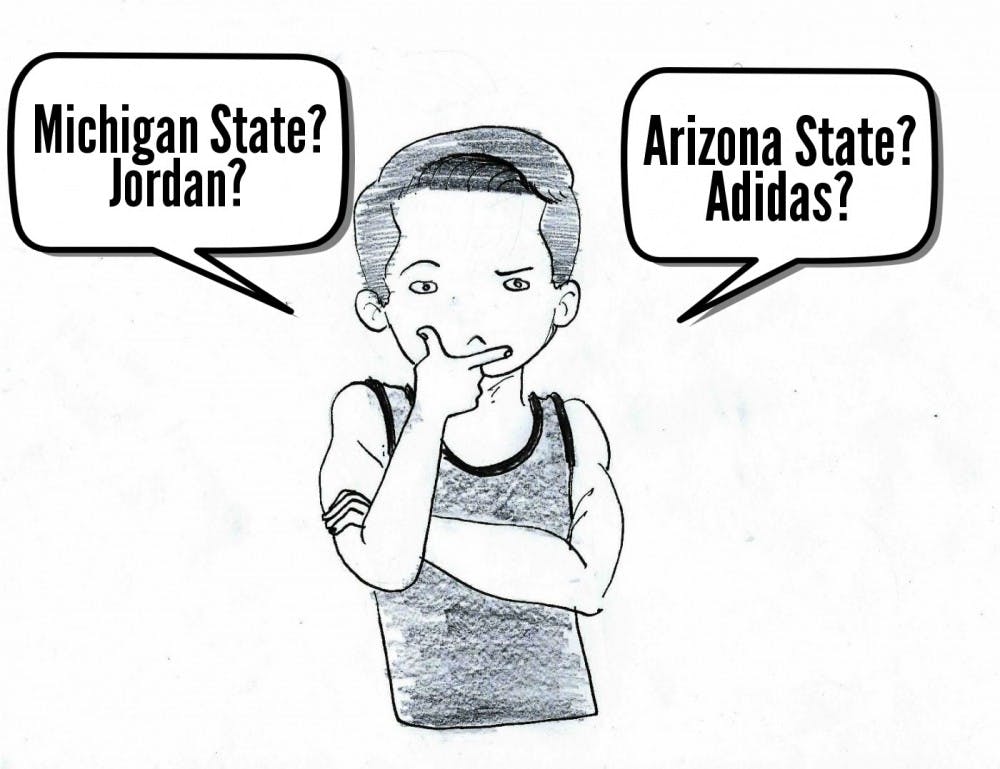After Doug Flutie, quarterback for the Boston College Eagles, threw a 48-yard Hail Mary pass that led his team to an unforgettable victory against the University of Miami in 1984, Boston College saw a 30 percent increase in applications over the next two years.
This phenomenon soon became known as the “Flutie Effect.”
The dominant factors that prospective college students look at when searching for their perfect college are typically understood to be academics, cost, location, population and reputation.
Though these are all certainly aspects of the college experience that future students take into consideration, a school’s successful athletic department also influences non-athlete applicant interest.
Even ASU, being a Division I school that has produced notable athletes like James Harden, has likely put itself on the minds of future students through the publicity of its sports programs.
The correlation between a college’s increasingly successful sports team and a larger applicant pool can be seen with a number of schools besides Boston College, namely in regard to men’s basketball and football.

Nevertheless, a collegiate sports team’s sudden triumph, such as Butler University’s Final Four appearance in 2010, is likely not a deciding factor in selecting a school to attend. Instead, it is more accurately described as extremely widespread advertisement for that school.
“Especially during high profile events like March Madness that draw a huge audience, athletes and schools have a chance to tell their stories to the world and show audiences the impact they can make in students' lives,” said Kyle Judah, innovation strategy consultant at Massachusetts Institute of Technology.
In turn, whether or not the school was already a fairly popular choice, this added publicity can put a college on a prospective student’s radar that they wouldn’t have considered otherwise.
“I’m sure for some people (a successful sports program) can build an attachment over the years and really help push them to attend, and for some they want the experience of attending a big college sports school,” Judah said. “But it's far more likely that it works at the top end of the student recruitment, and conversely, decision funnel. Maybe it makes you aware of a handful of schools that normally you might not have considered, but I don't know if it pushes anyone over the edge.”
Along with an increase in the quantity of applications, there’s also evidence to show an increase in the overall quality of applications.
“While it’s clear that the overall number of applications rise along with athletics success, we can also see that average incoming student GPA steadily increases in the years following a high profile national championship like football and basketball,” Judah said.
In the mid- to late-2000s, the University of Florida experienced constant success with both its men’s basketball and football programs. As Judah highlighted in his research for The Sports Business Exchange, although the number of applications received by the university grew by almost 30 percent between 2006 and 2009, the admissions rate dropped by about 11 percent, and the low end of incoming freshman GPAs rose from 3.9 to 4.2 on a 4.4-point scale.
What these trends show is that the additional exposure given to colleges with thriving sports programs helps attract a wider audience of prospective freshman that grants the school the ability to be more selective in accepting students.
Not only does a successful athletic department positively impact the institution it’s a part of, but it can also positively influence a student’s college experience. The exciting atmosphere that a booming, championship-winning basketball or football team can create is often something that students appreciate in their time at college.
“Sports are what bring people from totally different backgrounds, perspectives and experiences together,” Judah said. “Especially if your team has a crazy experience, that's a shared bond with your fellow students and alumni that you'll never forget.”
Reach the columnist at alexwolfe3098@gmail.com or follow @alexandrawolfe_ on Twitter.
Editor’s note: The opinions presented in this column are the author’s and do not imply any endorsement from The State Press or its editors.
Want to join the conversation? Send an email to opiniondesk.statepress@gmail.com. Keep letters under 500 words and be sure to include your university affiliation. Anonymity will not be granted.
Like The State Press on Facebook and follow @statepress on Twitter.




